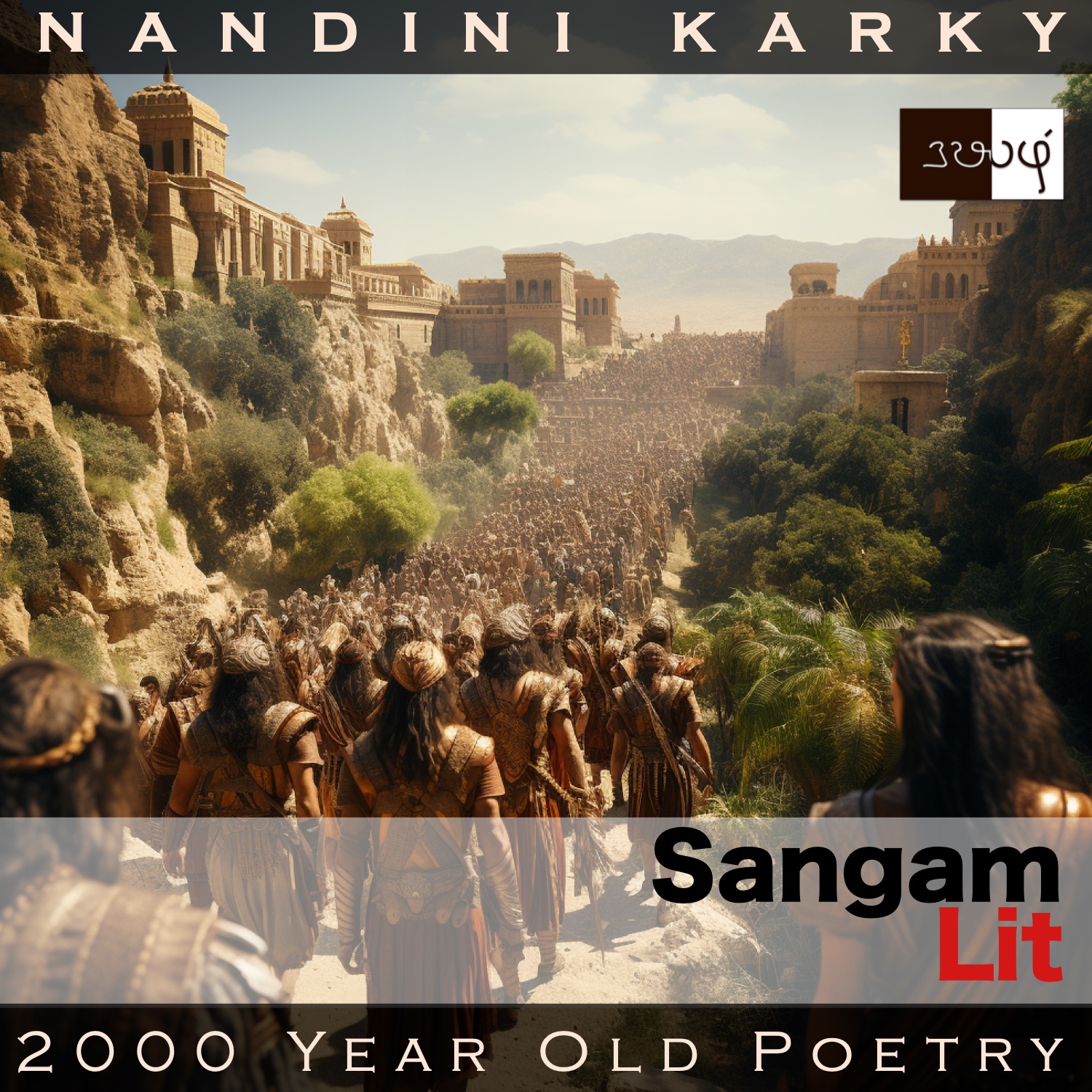Podcast: Play in new window | Download
Subscribe: Apple Podcasts | Spotify | Amazon Music | Android | iHeartRadio | TuneIn | RSS | More
In this episode, we perceive fascinating poetic devices to portray the power of a king, as depicted in Sangam Literary work, Puranaanooru 225, penned about the Chozha King Nalankilli by the poet Aalathur Kizhaar. Set in the category of ‘Pothuviyal Thinai’ or ‘Common Themes’, the verse reveals the dominance of this king when alive.

தலையோர் நுங்கின் தீம் சேறு மிசைய,
இடையோர் பழத்தின் பைங் கனி மாந்த,
கடையோர் விடு வாய்ப் பிசிரொடு சுடு கிழங்கு நுகர,
நில மலர் வையத்து வல முறை வளைஇ,
வேந்து பீடு அழித்த ஏந்து வேல் தானையொடு,
‘ஆற்றல்’ என்பதன் தோற்றம் கேள், இனி:
‘கள்ளி போகிய களரிஅம் பறந்தலை,
முள்ளுடை வியன் காட்டதுவே நன்றும்
சேட்சென்னி நலங்கிள்ளி கேட்குவன்கொல்?’ என,
இன் இசைப் பறையொடு வென்றி நுவல,
தூக்கணங் குரீஇத் தூங்கு கூடு ஏய்ப்ப
ஒரு சிறைக் கொளீஇய திரி வாய் வலம்புரி,
ஞாலங் காவலர் கடைத்தலை,
காலைத் தோன்றினும் நோகோ யானே.
Now, it’s the turn of the Chozha King Nalankilli to be praised after his demise. The poet’s words can be translated as follows:
“Those in the vanguard eat the sweet slush of the immature palmyra fruit, those in the middle guard relish the ripe fruit, and those in the rear guard partake in the sticky, fibrous tuber of this fruit. With such a huge army holding spears, he encircled this flower-like land with strength and ended the pride of kings many. And thus, he was the physical form of the word ‘skill’!
But now, asking ‘Is the great Nalankilli going to listen to this, from the thorny jungles of the cactus filled, dry wasteland?’, they make war drums resound with its fine sounds, and they take the conch shell that was lying in one corner like a weaver bird’s nest to wake up the kings of this world every morning. Hearing this, I suffer indeed!”
Let’s delve deeper into the words of this verse. The poet uses a striking portrait to describe the vastness of this king’s army. He says those in the front of this army, in the vanguard, would eat the slushy, cool fruit of the palmyra tree, called as ‘nungu’ in Tamil and ‘Ice apple’ in English. What’s great about an army relishing this delicacy of a fruit?, one might ask. The poet says, ‘Wait for it’, and adds how the middle segment of this army gets to eat the mature fruit of this same palm tree. What mature fruit? All the fruit we know is the white, translucent delicacy that’s a hydrating heaven-send in the hot months of an Indian summer. But I learnt today that we think so because we are urbanites and we know nothing more about this fruit. Apparently, this fruit continues to mature and becomes darker in colour and takes on a more solid texture, and it’s this mature fruit that the middle guard is eating. As if saying that’s not all, the poet adds the rear guard or the final company in the army, then gets to get the fibrous, sticky stage of this same palmyra fruit, that I learnt tastes very much like a coconut. Now, we understand that the poet is using the stages of fruiting in a palmyra tree to say that it takes months together for a section of this king’s army to pass by. No doubt, the poet has chosen the device of hyperbole or exaggeration, but nevertheless, it’s a stunning instance of this poet’s imagination.
Returning, we find the poet remarking how the king with such a huge army conquered the pride of enemy kings all around. The king was the epitome of the word ‘ability’, the poet adds. That was the past but now, the poet talks about how enemy kings dismiss the fear they had for Nalankilli by saying, ‘Is he going to hear this from the thorny jungles of the drylands, where he’s buried?’ and they resound their war drums as well as go find those conch shells, which, this far, was hanging like a weaverbird’s nest, covered in cobwebs, and they blow upon it, as a waking ritual. In short, there seems to be no fear of the great Nalankilli hearing all this and coming to attack them, as in the past, the poet illustrates. He concludes with the words that it is this sound that proclaims the king’s absence and pains his heart endlessly. Isn’t it fascinating how resounding sounds of drums and conch shells are used to illustrate the thundering silence in the absence of a person? Not minding the king’s attributes of seeking war, which are irrelevant to our times, we can still appreciate the poetic feast that has been spread for us, featuring the different fruits of a palmyra tree, even as the music of drumbeats and conch shells resounds in the background!




Share your thoughts...